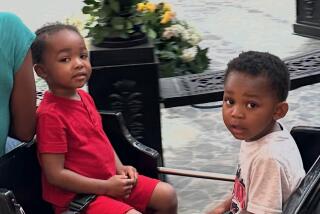Twins’ Illness Puts Angels at Their Doorstep
- Share via
CASCO, Maine — Last summer, as Shayne and Corey Earley lay curled into commas on the couch, intravenous poles hovering above them, their mother was explaining to a creditor why she couldn’t pay her bills again that month.
“My boys are dying,” Yvette Earley remembers saying. “We’re going to lose them both.”
The creditor, like the others, was unyielding: Pay the money.
But there was no money.
Yvette and her husband, Lawrence, were on the verge of losing their house. Their families were hundreds of miles away in Connecticut. They were virtual strangers in Casco, having moved to town only eight months before. And their 3-year-old twin sons, the center of their world, were dying from a rare genetic disease.
They felt utterly alone.
They were not.
Today the family’s mortgage is paid through the end of March. The kerosene tank is full. Nurses come daily to help care for the boys. The twins have new pajamas, new toys, new sheets for their beds.
And the Earley family has new reason to believe in people, thanks to an extraordinary outpouring of support that started in their town, spread across the state and even reached into Canada.
“I’ve said it before, but we have truly been touched by angels,” said Yvette Earley, 32. “We were put in this town for a reason.”
The boys cannot talk or swallow. They see only shadows. They need daily medication to keep their muscles from going into spasms.
But they are still kids: Dangling from their IV poles are fluffy white stuffed animals, two moose and two bears dressed as angels.
“We have angels all around us,” Yvette said.
Yvette and Lawrence Earley moved to Maine in 1994 shortly after they were married. They were drawn in late 1999 to the quiet beauty of Sebago Lake in the town of Casco, whose year-round population is 3,300. There they bought a cabin. They wanted children, and three years later Yvette became pregnant with Shayne and Corey.
Lawrence, 31, worked as a landscaper, Yvette as a nurse. Corey and Shayne loved crawling around behind their daddy, climbing on the furniture and digging in the sandbox. Photos on the walls show the twins in matching outfits with unruly curls and mischievous grins.
Rare Illness Diagnosed
But troubling signs began to appear by their first birthday, when the boys still hadn’t started walking independently. Doctors chalked it up to being born six weeks early. Three months later, the twins began working with an occupational therapist. When the boys reached 19 months, Yvette and Lawrence began to ask questions.
Doctors performed tests but had no answers. As the months passed, the boys’ conditions worsened.
“They stopped developing. They stopped being able to stand, able to feed themselves. Every week we’d see them lose something, until it was every day,” Yvette said. “It was absolutely terrifying.”
Last May the Earleys took the twins to Children’s Hospital in Boston, where a geneticist was finally able to deliver a chilling diagnosis: metachromatic leukodystrophy, a rare genetic disorder that destroys the fatty covering that insulates nerve fibers in the brain.
Symptoms usually appear when a child is 12 to 18 months old. The disease slowly robs its victims of the ability to walk and talk and causes severe pain in the limbs, and sometimes convulsions. There is no cure, and victims rarely live past 5.
The boys were given months to live.
When their day care center told the Earleys they could no longer take the boys, Yvette and Lawrence began taking turns calling in sick. When Lawrence missed too many days, he had to quit his job.
Money was tight. The couple fell behind on bills. Creditors began calling repeatedly, demanding money. The Earleys were on the verge of bankruptcy.
“Nothing else mattered but the boys,” Lawrence said.
Increasingly desperate, the Earleys called the Jason Program, a social service group in Cumberland, which recommended they get in touch with neighbors.
They knew only one. Deborah Poulin, who worked at the town hall, had introduced herself when the Earleys registered their car.
The Earleys broke down and dialed.
Poulin called friends, and a town meeting was organized. Twenty people who showed up were given tips from a representative from the Jason Program on things they could do to help.
The town soon took the Earleys under its wing.
A car repair shop fixed their vehicles for free. A stranger gave them some of the money from each cord of wood he sold. Children collected coins in tin cans. Grown-ups held benefit suppers and dances, a bike raffle and a golf tournament.
A local lawyer stepped in to placate creditors. A carpenter and electrician worked on their house, free. A pizza parlor, Bob’s Place, invited the Earleys to call whenever they wanted a free meal.
Their church, aptly named Our Lady of Perpetual Help in Windham, collected money.
“We’ve been there since the beginning, and we’ll be there at the end,” said the Rev. Ed Thompson. “The community wants to be there for this family.”
In September Yvette left her job, finally able to dedicate her time to taking care of her boys.
“It’s been an awesome experience--a tragedy, but one that’s touched us and so many people,” Yvette said, even as she has come to accept that without gene therapy, any more children she and Lawrence have would likely be afflicted with the same rare disorder.
The spirit of giving rippled through the state after the story made the news. The Earleys declined to say how much has been donated, but they said the donations have not ceased in the months since their story was first told.
The publicity has brought the Earleys letters from all over the country and has put them in contact with other parents of children who have the disease.
“A few weeks ago a man knocked on the door and handed me an envelope,” Lawrence said. “I thought it was a subpoena. I turned it over and it said, ‘To Corey and Shayne.’ Inside was $50. All I could do was wave to the man as he pulled out of the driveway.”
A musician, Dave Thibodeau of Portland, gave in his own way: He wrote a song, “Two of a Kind,” with proceeds going to the family. The song is an upbeat melody that celebrates the twins’ lives.
“I wanted to write something that served as a reminder to people that the twins were once able to share everything normal kids share,” he said.
Couple’s Burden Eased
The twins’ story is uplifting because of the way it has brought the community together. But a tragic ending is inevitable.
Doctors believe the boys will die this spring. A funeral parlor is donating its services. The church plans to hold a reception. Musicians have offered to play.
“We don’t have to worry about anything except how to say goodbye,” Yvette said. “We don’t know how that will be. Right now they are still here. We can still touch them, still talk to them. Still tell them we love them.”
Yvette believes her boys have touched the community in a unique way. But she hopes their short lives will achieve one more goal: to raise awareness of leukodystrophy and the need to screen for the disease.
“Our boys have touched so many people,” their mother said. “They’re angels themselves.”
*
Metachromatic leukodystrophy: https://www.mldfamily.org/
*
To contact the Earley family: P.O. Box 760, South Casco, Maine 04077.
More to Read
Sign up for Essential California
The most important California stories and recommendations in your inbox every morning.
You may occasionally receive promotional content from the Los Angeles Times.













